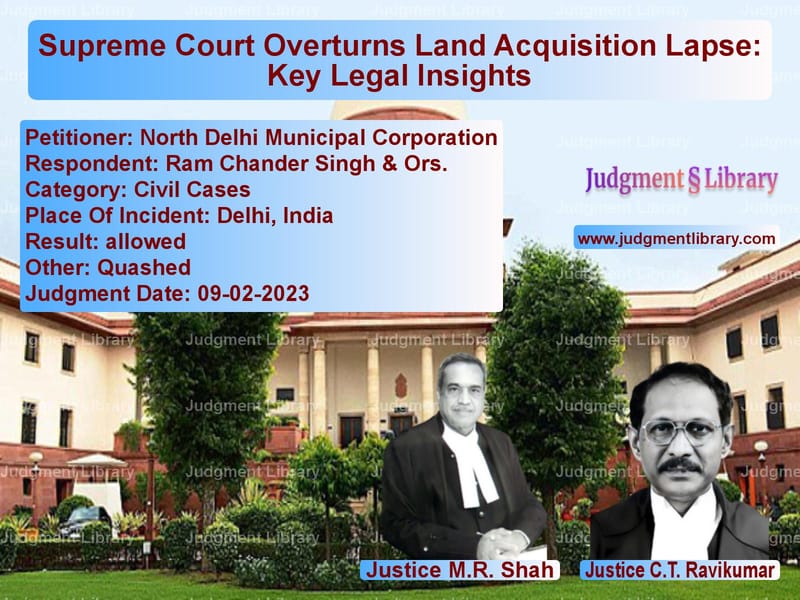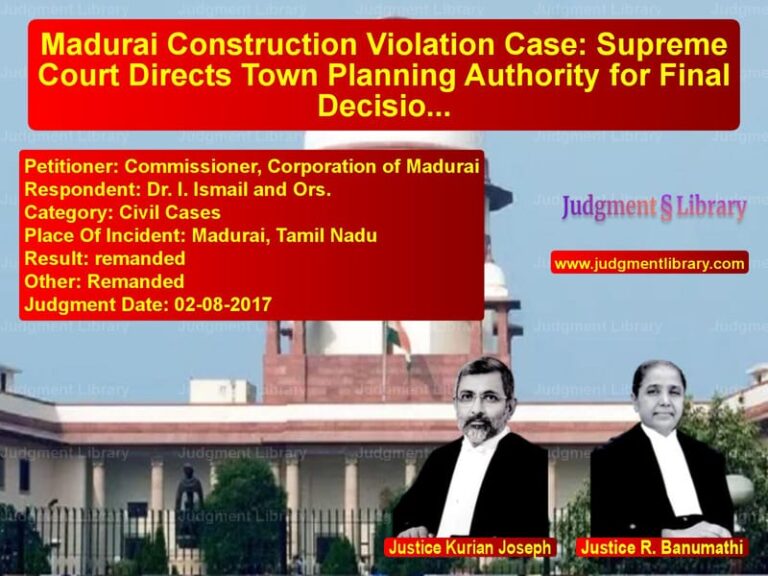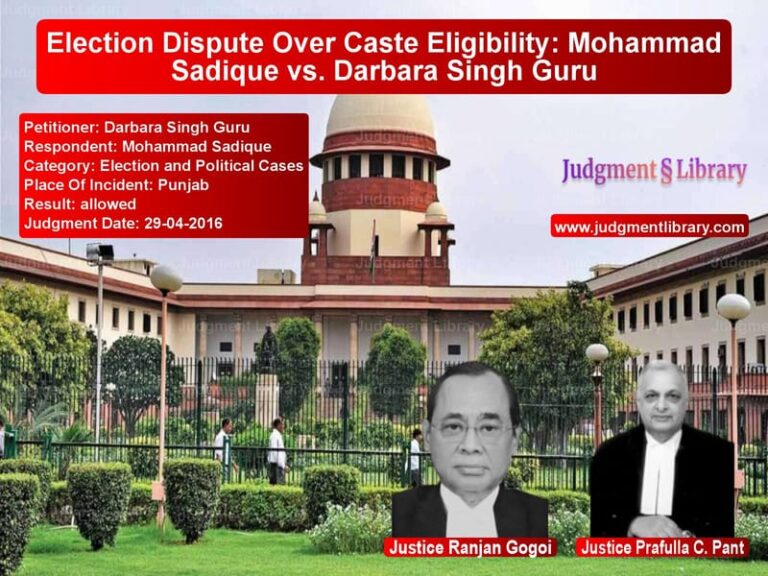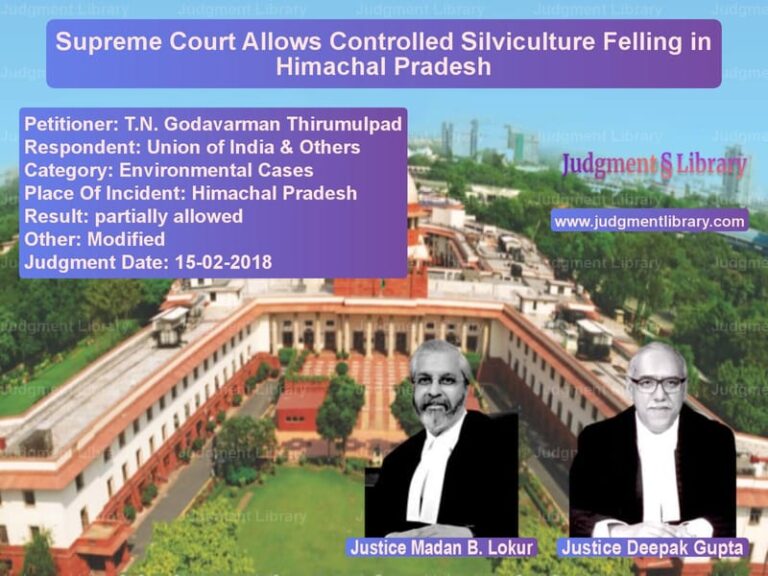Supreme Court Overturns Land Acquisition Lapse: Key Legal Insights
The Supreme Court of India recently ruled on the case of North Delhi Municipal Corporation vs. Ram Chander Singh & Ors., addressing a dispute over land acquisition under the Right to Fair Compensation and Transparency in Land Acquisition, Rehabilitation and Resettlement Act, 2013. The respondents had approached the Delhi High Court seeking a declaration that the acquisition of their land had lapsed under Section 24(2) of the Act, 2013. The High Court ruled in their favor, but the Supreme Court overturned the decision, clarifying important legal principles regarding land possession and compensation.
Background of the Case
The dispute arose over land in village Chowkri Mubarakbad, which had been acquired by the government under the Land Acquisition Act, 1894. The key legal issues in the case were:
- Whether possession of the acquired land had been legally taken.
- Whether compensation was properly tendered to the landowners.
- Whether the acquisition had lapsed under Section 24(2) of the Act, 2013.
The High Court, citing the case of Pune Municipal Corporation vs. Harakchand Misirimal Solanki, held that since compensation was not paid to the original owners, the acquisition had lapsed. However, the Supreme Court reviewed the case in light of the Constitution Bench judgment in Indore Development Authority vs. Manoharlal and reached a different conclusion.
Petitioners’ Arguments
- The North Delhi Municipal Corporation (NDMC) argued that physical possession of the land had been taken on May 1, 1964, and handed over to the requisitioning agency.
- They contended that compensation had been deposited with the Reference Court in 1965 and later transferred to the Treasury in 1967.
- The petitioners relied on the Supreme Court’s ruling in Indore Development Authority, which overruled the Pune Municipal Corporation judgment and held that deposit of compensation in the Treasury does not invalidate acquisition.
Respondents’ Arguments
- The landowners argued that they never received compensation and that possession remained with them.
- They claimed that mere deposit of compensation in the Treasury did not constitute valid payment.
- The respondents relied on the High Court’s reasoning that compensation must be directly paid to landowners for the acquisition to remain valid.
Key Observations by the Supreme Court
The Supreme Court examined the facts and legal precedents and made the following observations:
- The Court held that once possession is taken, the land vests in the government, and there is no provision under the Act, 2013, to divest it.
- It reaffirmed that compensation deposited in the Treasury fulfills the obligation under land acquisition laws, as long as no active demand for payment was made by landowners.
- The Supreme Court clarified that the Pune Municipal Corporation ruling had been overruled in Indore Development Authority, which established that land acquisition does not lapse merely because compensation remains unpaid.
- The Court emphasized that claims of lapsed acquisition must be supported by substantial evidence showing that neither possession was taken nor compensation was deposited.
Judgment
The Supreme Court ruled in favor of the North Delhi Municipal Corporation:
- The High Court’s judgment was quashed, and it was declared that the land acquisition had not lapsed.
- The Court directed that if compensation had not been paid to the recorded owners, they could still claim it from the authorities.
- The ruling reaffirmed the principle that landowners cannot challenge concluded acquisition proceedings decades later without strong legal grounds.
Implications of the Judgment
This ruling has significant implications for land acquisition cases:
- Clarity on Compensation Payment: The judgment confirms that compensation deposited in Treasury satisfies legal requirements.
- Protection of Government Acquisitions: The ruling prevents frivolous claims seeking to invalidate decades-old acquisitions.
- Guidance on Section 24(2) of the Act, 2013: The Court provided authoritative clarification that both possession and compensation must be absent for an acquisition to lapse.
- Strengthening the Principle of Finality: The ruling discourages reopening of settled land acquisition cases without strong legal justification.
Conclusion
The Supreme Court’s decision in this case is a landmark ruling that upholds the integrity of government land acquisitions. By rejecting the claim of lapsed acquisition, the Court has provided clarity on the legal standards governing possession and compensation. This judgment ensures that public projects dependent on acquired land are not jeopardized by belated challenges and sets a strong precedent for future land acquisition disputes.
Petitioner Name: North Delhi Municipal Corporation.Respondent Name: Ram Chander Singh & Ors..Judgment By: Justice M.R. Shah, Justice C.T. Ravikumar.Place Of Incident: Delhi, India.Judgment Date: 09-02-2023.
Don’t miss out on the full details! Download the complete judgment in PDF format below and gain valuable insights instantly!
Download Judgment: north-delhi-municipa-vs-ram-chander-singh-&-supreme-court-of-india-judgment-dated-09-02-2023.pdf
Directly Download Judgment: Directly download this Judgment
See all petitions in Property Disputes
See all petitions in Landlord-Tenant Disputes
See all petitions in Specific Performance
See all petitions in Damages and Compensation
See all petitions in Contract Disputes
See all petitions in Judgment by Mukeshkumar Rasikbhai Shah
See all petitions in Judgment by C.T. Ravikumar
See all petitions in allowed
See all petitions in Quashed
See all petitions in supreme court of India judgments February 2023
See all petitions in 2023 judgments
See all posts in Civil Cases Category
See all allowed petitions in Civil Cases Category
See all Dismissed petitions in Civil Cases Category
See all partially allowed petitions in Civil Cases Category







